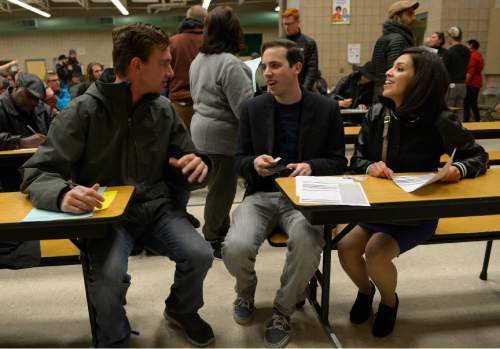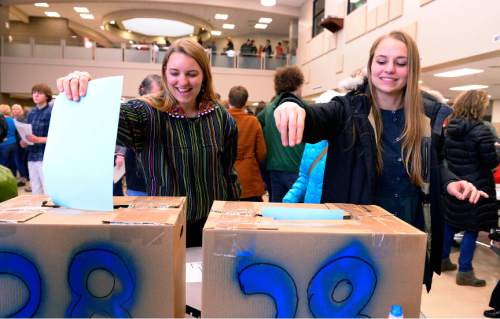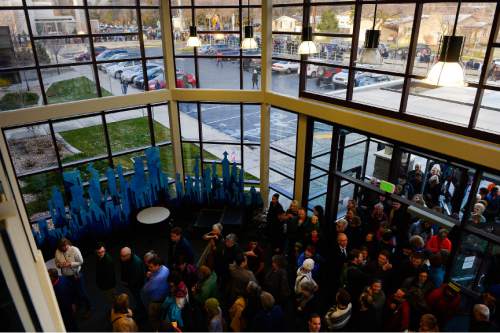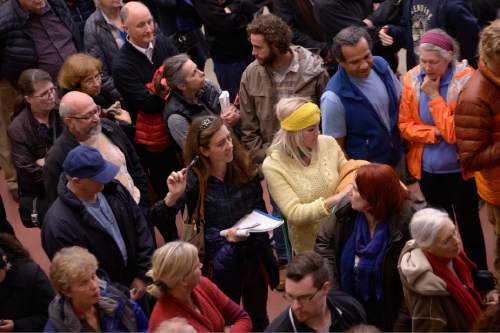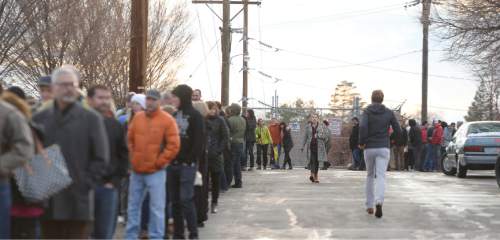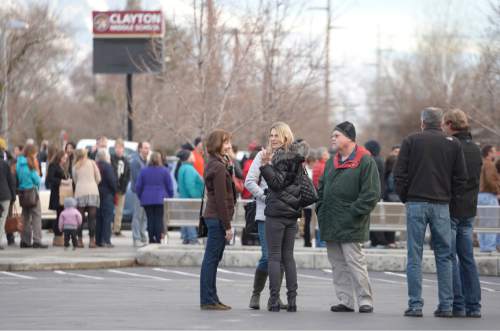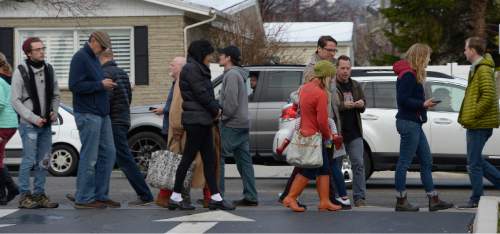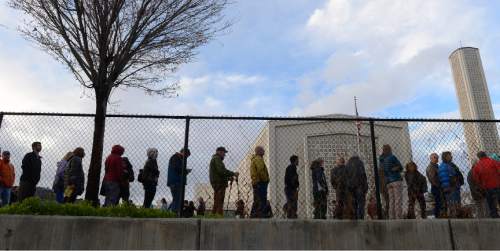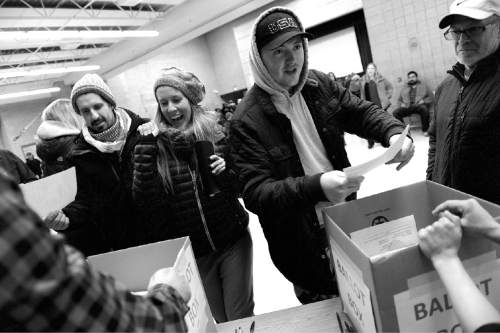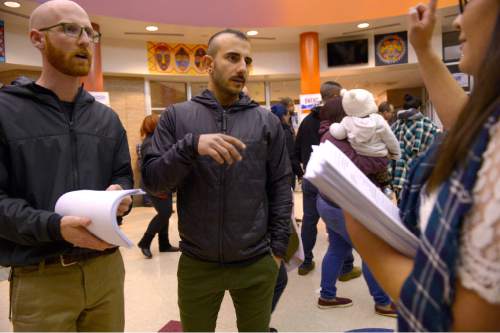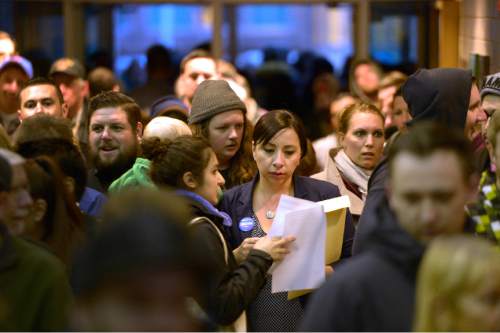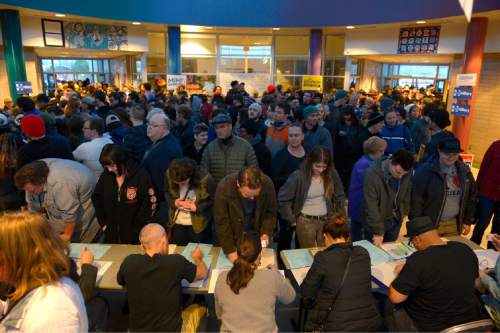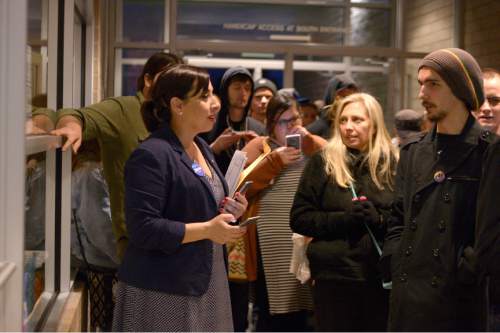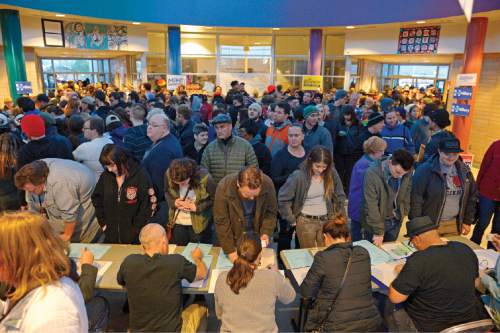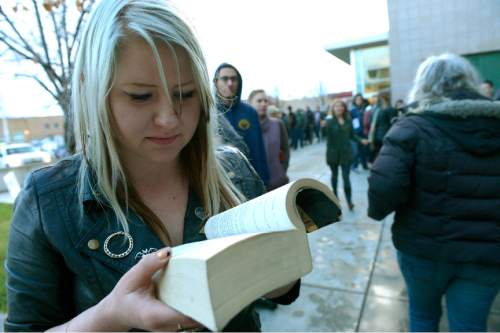This is an archived article that was published on sltrib.com in 2016, and information in the article may be outdated. It is provided only for personal research purposes and may not be reprinted.
Vermont Sen. Bernie Sanders trounced Democratic front-runner Hillary Clinton in just about every corner of Utah, receiving 79 percent of the vote and likely claiming 27 of the state's 33 pledged delegates.
Clinton failed to get a majority in any of Utah's caucus meetings, and Sanders even picked up one of the state's four superdelegates.
That's based on unofficial results from the Utah Democratic Party, and the count isn't going to be complete for some time.
Due to what state party Chairman Peter Corroon called a "ginormous" turnout, party officials started handing out ballots late Tuesday to people without checking voter registration, address or age. The party now wants to go through the 78,000 votes, ballot by ballot, to ensure each one should count and in which congressional district. A few caucus meetings also turned in the paper ballots late.
In consultation with the Sanders and Clinton campaigns, the party agreed to wait until the April 6 canvass to release the official tally.
"Clearly the results are not going to flip in any way," said Democratic Party Executive Director Lauren Littlefield, noting that on the national level, the race is a fight for individual delegates. "But because this is a tight race, we want to make sure our bases are covered."
Clinton, who won Arizona's primary Tuesday, has a big delegate lead on Sanders, who is counting on continued success in Western states to close the gap.
The Salt Lake Tribune based its preliminary delegate split on unofficial election results released by the party. Nine of those 33 pledged delegates are awarded based on the statewide vote, while the remainders are split among Utah's four congressional districts. The Associated Press says the split is 26 for Sanders and six for Clinton, leaving one delegate unaccounted for.
That doesn't include superdelegates, like Corroon, who are party insiders allowed to pick their favorite candidate regardless of the caucus vote. Corroon, who isn't a fan of the superdelegate process in the Democratic Party, said he'd support the candidate who won the caucus and therefore is supporting Sanders.
Two of the state's superdelegates — Patrice Arent, the national committeewoman, and Breanne Miller, the party's vice chairwoman — are supporting Clinton, who received 20 percent of the caucus vote. National Committeeman Wayne Holland says he hasn't decided.
Littlefield called the big turnout, which included 20,000 new voters, "the largest growth opportunity for the Utah Democratic Party in decades," and yet she and Corroon criticized state leaders for not funding a full primary, instead leaving the vote to party-run caucuses.
A primary would have allowed voters to go to their regular precincts throughout the day or vote by mail and would have cost $3 million.
Instead, the Democrats spent $20,000 to fund 90 voting locations staffed by volunteers with only a guess at what the turnout would be. That estimate was low, and as a result, half the caucus meetings ran out of ballots, causing a scramble to print more.
The lines in some locations stretched for city blocks, with the party promising to let anyone vote if they were in line by 8:30 p.m. At least early in the night, there was a communal, even celebratory, vibe in the crowd, though that dissipated as the night wore on and the temperature dropped. At Beehive Elementary in Kearns, the last voters made it to the front of the line at about 11 p.m.
The two biggest caucus meetings, held at Clayton Middle School on Salt Lake City's east side and in the heart of Provo, each had nearly 4,000 people vote, dwarfing the number of ballots on hand.
"Overwhelming turnout is a great problem to have," Corroon said, "but it comes with the challenges as well."
The turnout was unprecedented for a caucus, but it fell far short of what the state has seen in presidential primaries. As an example, in 2008, when left-leaning Utahns had a choice between Hillary Clinton and then-Sen. Barack Obama, more than 132,000 voted.
Unlike that primary, in Tuesday's caucus, deployed members of the military and overseas voters were "disenfranchised," Corroon said. Parents had to decide who would stay with their children and who would stand in the long lines.
And it limited access for the elderly, the disabled and people who work at night.
At some caucuses, voters complained that Democratic volunteers didn't help those who were frail or disabled navigate the long lines, with some eventually giving up and going home.
Corroon acknowledged that the Utah Democratic Party could have planned for more contingencies, but he said the party, which relies on volunteers, was out of its depth.
"State parties should be in the business of winning elections," he said, "not running elections."
The Utah Legislature decided against spending $3 million for a primary election after the Republican Party said it would hold its own caucus anyway. Republicans control Capitol Hill, 87-17. As part of the caucus, the GOP set up an online voting option, which the Democrats decided against because of the $80,000 price tag.
Despite his frustrations, which were shared by many who waited hours to vote, Corroon said the caucus was a proud moment.
"Utah was in the game," he said. "And the way we voted last night made a difference."
Twitter: @mattcanham


